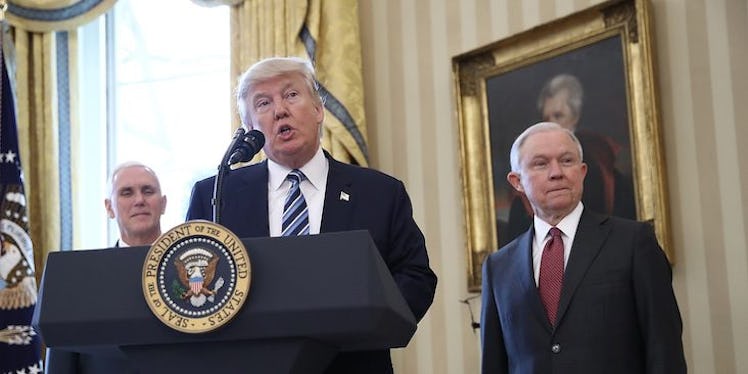
Donald Trump Is “Looking At” Firing AG Jeff Sessions, But It Might Be Difficult
President Donald Trump and his one-time ally, Jeff Sessions, are on the outs. The president has been publicly critical of the “beleaguered” attorney general over the past week, berating him on Twitter and saying that he never would have hired him had he known Sessions would recuse himself in the investigation into Russia's election interference. Sessions, for his part, is reportedly getting sick of Trump's abuse.
But things went ominous on July 25, when at several points Trump hinted that he might consider firing the attorney general.
First he posted an early morning diatribe to Twitter, in which he called Sessions “weak” and asked why he hadn't investigated Hillary Clinton. Then, Trump told The Wall Street Journal that he was “just looking at” how long he would criticize Sessions without firing him, and that he was “very disappointed” in the attorney general. Finally, at a press conference on Tuesday, he said that “time will tell” about Sessions' future with the administration.
Trump mostly seems angry that Sessions, by his recusal, has no influence on the state of the Russia investigation.
He said,
If he was going to recuse himself, he should have told me before taking office, and I would have quite simply picked somebody else.
The situation has led to speculation that he wants to fire Sessions so he can appoint a replacement who will dismiss special counsel Robert Mueller, who's leading the investigation.
So, things aren't looking great for Sessions's job security. Could he go the way of former FBI Director James Comey?
The short answer is, well, yes. Trump could fire him. It's after that that things go wonky.
If it was another time and place, we could assume that Trump had learned from the backlash he got after he fired Comey, possibly for refusing to drop the investigation into Russian meddling — but Trump is nothing if not unpredictable.
He requires loyalty from his associates, and he seems to view Sessions' recusal from the Russia investigation as a refusal to have his back. If he fired Sessions with an eye to replace him with a loyalist who would get involved with the Russia investigation, it wouldn't go over well.
The regulations about who would replace Sessions might not work in Trump's favor.
Typically, an attorney general who leaves office would be replaced by his second in command, the deputy attorney general, as Slate points out. In this case, that's Rod Rosenstein, who seems unlikely to have Trump's support in the role.
For one thing, Rosenstein was reportedly angry at being saddled with the blame for Comey's firing back in May, after the White House used a memo he wrote as justification for dismissing the FBI director. For another, Rosenstein is the one who appointed Mueller to take lead on investigating Russian meddling in the first place. If Trump is looking for someone to take a hand in the Russia investigation, Rosenstein is unlikely to oblige.
Trump could play a game of musical chairs with the post, but Congress might block him.
There are two ways that Trump could bypass Rosenstein and appoint a new attorney general. One is to invoke the Federal Vacancies Reform Act of 1998, under which Trump could put someone who had previously been confirmed by the Senate for another role into the spot. The problem there is that the wording of the Act isn't clear about whether it applies to firings — the Act is meant for when officials die, resign, or are otherwise “unable” to do the job.
The second way is via a recess appointment. When the Senate is on a break of more than 10 days (as will happen in August, for the summer recess) the president has authority to fill empty positions without going through the Senate.
Either way, senators have said they wouldn't be down.
Senate Minority leader Chuck Schumer said that Senate Democrats would use every tool they had to prevent Trump from making such a move, and Senator Angus King, an Independent from Maine, said he couldn't see Congress standing for it. He told Reuters that if Trump tried to appoint an attorney general who would fire Mueller, legislators would push back.
“My expectation is you'd see a special prosecutor pass by veto-proof majorities in both houses. And the investigation would continue,” he said.
I guess, as Trump says, time will tell.